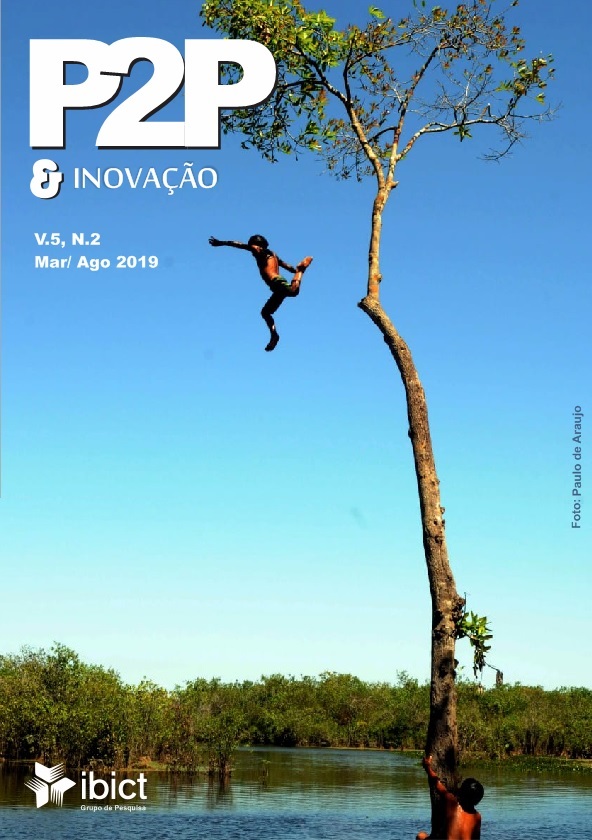A TRANSFORMAÇÃO DIGITAL E A GESTÃO DO CONHECIMENTO: CONTRIBUIÇÕES PARA A MELHORIA DOS PROCESSOS PRODUTIVOS E ORGANIZACIONAIS
DOI:
https://doi.org/10.21721/p2p.2019v5n2.p154-175Resumo
A Transformação Digital (TD), também chamada de Indústria 4.0, tem implementado tecnologias para o aperfeiçoamento dos processos produtivos e de gestão organizacional. Diante desse cenário, o presente estudo pretende verificar como a Gestão do Conhecimento (GC) pode contribuir para a TD nas organizações e, ao mesmo tempo, como a TD está colaborando para a GC. Sendo assim, primeiramente a GC é contextualizada junto aos conceitos de TD. Então, para se atingir o objetivo deste estudo, uma revisão sistemática da literatura foi realizada, considerando a relação dos pilares da Indústria 4.0 e dos Sistemas Ciber-Físicos com a GC. Para finalizar, os resultados da revisão sistemática são analisados e discutidos para responder ao objetivo deste trabalho.Downloads
Referências
ABII. Associação Brasileira de Internet Industrial. Disponível em: <https://www.abii.com.br/>.
ANSARI, F.; SEIDENBERG, U. A portfolio for optimal collaboration of human and cyber physical production systems in problem-solving. Proceedings of the 13th International Conference on Cognition and Exploratory Learning in the Digital Age, CELDA 2016. Anais...2016
BRASIL. Perspectivas de especialistas sobre a manufatura avançada no brasil - 2016. [s.l: s.n.].
BRASIL. Estratégia Brasileira para a Transformação Digital. [s.l: s.n.].
BRASIL. Agenda brasileira para a Indústria 4.0. Disponível em: <http://industria40.gov.br/>.
BURZLAFF, F.; BARTELT, C. Knowledge-driven architecture composition: Case-based formalization of integration knowledge to enable automated component coupling. Proceedings - 2017 IEEE International Conference on Software Architecture Workshops, ICSAW 2017: Side Track Proceedings, p. 108–111, 2017.
CISCO SYSTEMS. Fog Computing and the Internet of Things: Extend the Cloud to Where the Things Are. Www.Cisco.Com, p. 6, 2016.
DOSSOU, P. E.; NACHIDI, M. Modeling Supply Chain Performance. Procedia Manufacturing, v. 11, p. 838–845, 2017.
GRONAU, N.; GRUM, M. Integration of Augmented Reality Technologies in Process Modeling - The Augmentation of Real World Scenarios With the KMDL. Proceedings of the Seventh International Symposium on Business Modeling and Software Design, n. January, p. 206–215, 2017.
GROOVER, M. P. Automação industrial e sistemas de manufatura/ Mikell P. Groover ; tradução Jorge Ritter, Luciana do Amaral Teixeira, Marcos Vieira ; revisão técnica José Hamilton Chaves Gorgulho Júnior, 2011. Disponível em: <http://search.ebscohost.com/login.aspx?direct=true&db=cat05351a&AN=bib.110601&site=eds-live>
IVI. Strategic implementation framework of industrial value chain for connected industries. Tokyo: [s.n.]. Disponível em: <https://iv-i.org/wp/wp-content/uploads/2018/04/IVRA-Next_en.pdf>.
KAMP, B.; OCHOA, A.; DIAZ, J. Smart servitization within the context of industrial user–supplier relationships: contingencies according to a machine tool manufacturer. International Journal on Interactive Design and Manufacturing, v. 11, n. 3, p. 651–663, 2017.
KOTYNKOVA, M. Re-Industrialization of Europe: Industry4.0 and the Future of Work. European Scientific Journal, v. 7881, n. April, p. 249–256, 2017.
LOTTI OLIVA, F. Knowledge management barriers, practices and maturity model. Journal of Knowledge Management, v. 18, n. 6, p. 1053–1074, 2014.
LU, Y. Industry 4.0: A survey on technologies, applications and open research issues. Journal of Industrial Information Integration, v. 6, p. 1–10, 2017.
LYDON, B. Industry 4.0: Intelligent and flexible production. InTech, 2016.
MALONE, D. Knowledge management. A model for organizational learning. International Journal of Accounting Information Systems, v. 3, n. 2, p. 111–123, 2002.
MARR, B. Big Data: 20 Mind-Boggling Facts Everyone Must Read. Forbes, 2015.
MENON, K.; KÄRKKÄINEN, H.; GUPTA, J. P. Role of Industrial Internet platforms in the management of product lifecycle related information and knowledge. IFIP International Conference on Product Lifecycle Management. Anais...Tampere: Springer, 2016Disponível em: <http://link.springer.com/10.1007/978-3-319-54660-5>
PFEIFFER, S. The Vision of “Industrie 4.0” in the Making—a Case of Future Told, Tamed, and Traded. NanoEthics, v. 11, n. 1, p. 107–121, 2017.
PFEIFFER, S.; SUPHAN, A. The Labouring Capacity Index: Living Labouring Capacity and Experience as Resources on the Road to Industry 4.0. Stuttgart: [s.n.].
POSSELT, G. et al. Intelligent Learning Management by Means of Multi-sensory Feedback. Procedia CIRP. Anais...2016
PRIFTI, L. et al. A Competency Model for “Industrie 4.0” Employees. 13th International Conference on Wirtschaftsinformatik, p. 46–60, 2017.
RÜBMANN, M. et al. Industry 4.0: World Economic ForumThe Boston Consulting Group. [s.l: s.n.]. Disponível em: <https://www.bcgperspectives.com/Images/Industry_40_Future_of_Productivity_April_2015_tcm80-185183.pdf>.
SAMARANAYAKE, P.; RAMANATHAN, K.; LAOSIRIHONGTHONG, T. Implementing industry 4.0 - A technological readiness perspective. IEEE International Conference on Industrial Engineering and Engineering Management, v. 2017–Decem, p. 529–533, 2018.
SCHEUERMANN, C. et al. Incident Localization and Assistance System: A case study of a Cyber-Physical Human System. 2015 IEEE/CIC International Conference on Communications in China - Workshops, CIC/ICCC 2015, p. 57–61, 2017.
SHAFIQ, S. I. et al. Virtual engineering object (VEO): Toward experience-based design and manufacturing for industry 4.0. Cybernetics and Systems, v. 46, p. 35–50, 2015.
SHAMIM, S. et al. Examining the feasibilities of Industry 4.0 for the hospitality sector with the lens of management practice. Energies, v. 10, n. 4, 2017.
SMART MANUFACTURING LEADERSHIP COALITION. SMLC Forum: Priorities, Infrastructure, and Collaboration for Implementation of Smart Manufacturing. Washington: [s.n.]. Disponível em: <https://smartmanufacturingcoalition.org/sites/default/files/smlc_forum_report_vf_0.pdf>.
SONNTAG, D. et al. Overview of the CPS for Smart Factories Project: Deep Learning, Knowledge Acquisition, Anomaly Detection and Intelligent User Interfaces. p. 487–504, 2017.
STOCKER, A. et al. Mensch-zentrierte IKT-Lösungen in einer Smart Factory. Elektrotechnik und Informationstechnik, v. 131, n. 7, p. 207–211, 2014.
SYNNES, E. L.; WELO, T. Enhancing Integrative Capabilities through Lean Product and Process Development. Procedia CIRP. Anais...2016
VLADOVA, G.; ULLRICH, A.; SULTANOW, E. Demand-oriented Competency Development in a Manufacturing Context: The Relevance of Process and Knowledge Modeling. p. 4424–4433, 2017.
WIIG, K. M. Knowledge Management: An Introduction and Perspective. Journal of Knowledge Management, v. 1, n. 1, p. 6–14, 1997.
WOOD, R. Three keys to designing and configuring secure industrial networks. InTech, 2017.
WUEBBEKE, J. et al. Made in China 2025MERICS Papers on China. [s.l: s.n.]. Disponível em: <https://www.merics.org/fileadmin/user_upload/downloads/MPOC/MPOC_Made_in_China_2025/MPOC_No.2_MadeinChina_2025.pdf>.
Publicado
Edição
Seção
Licença
A revista é publicada sob a licença Creative Commons - Atribuição - Uso Não Comercial - Partilha nos Mesmos Termos 4.0 Internacional.
O trabalho publicado é considerado colaboração e, portanto, o autor não receberá qualquer remuneração para tal, bem como nada lhe será cobrado em troca para a publicação.
Os textos são de responsabilidade de seus autores.
É permitida a reprodução total ou parcial dos textos da revista, desde que citada a fonte.















